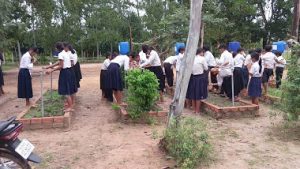Comentarios oficiales del Diálogo para la Cumbre de las Naciones Unidas sobre los Sistemas Alimentarios de 2021
Tipo de diálogo
Fase
Convocado por
Idioma del Diálogo
Fecha/hora
Para:
Ciudad
Enfoque geográfico
Formato
Por favor revise los detalles que encontrará más abajo para obtener información sobre cómo registrarse en el caso de que esté disponible o contacte al convocante si le gustaría asistir.
Administrador
Descripción
Access to WASH in rural Cambodia is still low and Nutrition-Sensitive WASH faces many challenges in practice at the local level. These challenges include identifying who has the responsibilities and the interests to take action and what their role and terms of reference (TOR) should be. There is a strong need for SBCC and the establishment of regulations, protocols and reporting systems. Those responsible for WASH at a local level complains of a lack of incentives. Lack of budget and focal points to drive improvement have been critical constraints in practice.
Priorities for the joint priority, in order of importance, include:
- Access to and use of latrines;
- Handwashing with water and soap;
- Access to and use of safe drinking water;
- Clean houses / yards.
The key stakeholder group for the integration of WASH and Nutrition is the WASH-Nutrition Sub-Group of the TWG for WASH and the TWG for FSN. This group is well-established, formally supported and advanced in functional terms. The group has developed its own strategic guidelines and may serve as a model for driving coordinated activities forward for other joint priorities. The Sub-Group brings together representatives from CARD, MRD, MoH, MoP, MoI and the National Committee for Sub-National Democratic Development (NCDD), the donors, UN, civil society and the private sector.
This event will expand beyond the dialogue and documentation for the 2nd NSFSN, to look into the relationship between Nutrition-Sensitive WASH and the food system as a whole. Water has huge role to play in food systems as an essential requirement for life itself, a habitat for aquatic species, the basis for crop and livestock production, critical for processing activities, a transport medium, source of energy and also, potentially, as the medium for transmission of disease and cause of floods and drought. Water is something of profound importance in food systems.
Nutrition-sensitive WASH has more direct implications for nutrition and thus a key role for food systems as established in the2nd NSFSN. Our purpose in this dialogue is to look into the implications of nutrition-sensitive WASH for the food system, to identify the critical issues and to discuss the actions required to promote sustainable development and sustainability in the food system for 2030. The dialogue will look into the current start point, the implications of COVID-19 and for COVID-19 Recovery and on into the future, looking into the roadmap towards sustainability of the food system and the critical contributions of nutrition-sensitive WASH. It is expected that a broad mix of participants will bring some fresh ideas and connections to light to expand the voices heard in the discussion and to increase the opportunities for novel solutions to emerge. Participants from the irrigation sub-sector, from fisheries, agriculture, industry, health, planning and rural development are all encouraged to join, Representatives from national and sub-national level, women, youth, the public and private sector and civil society are all welcome to join the event.
Agradecimiento


